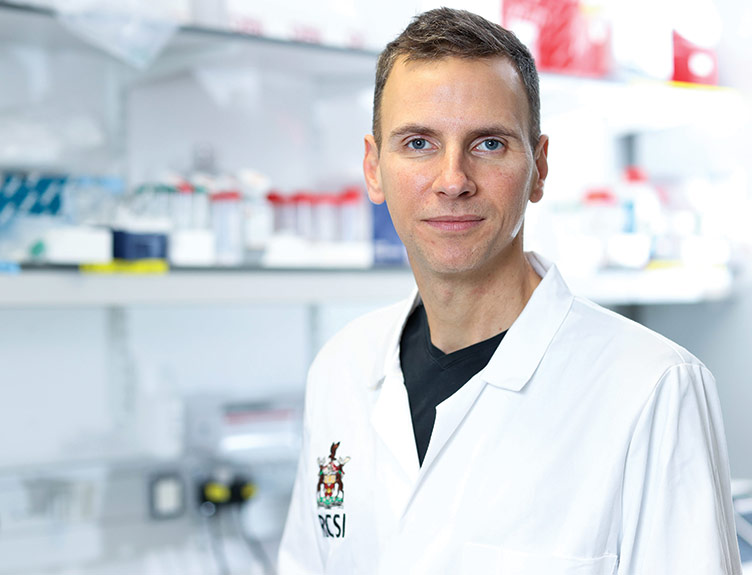HRB invests in population health and health services research PhD programme
Risk of suicide after self-harm, work stress in non-consultant hospital doctors and monitoring and assessing the impact of the economic crisis on the Irish health system are among the research areas that will be explored by scholars of an innovative new PhD programme in population health and health services research.
The SPHeRE (Structured Population and Health-services Research Education) programme has been awarded €6.3 million by the Health Research Board (HRB) and will be launched today at RCSI in Dublin.
The programme is a partnership between RCSI, University College Cork (UCC) and Trinity College Dublin (TCD). SPHeRE's key objectives are to establish a national network in population health and health services research, expanding to include all higher education institutions in Ireland, and to develop a programme of online modular education accessible to all engaged in this type of research.
Professor Anne Hickey, Director of SPHeRE and Associate Professor of Psychology at RCSI said: “The SPHeRE programme will create a network of highly trained researchers who can competently research aspects of the current Irish health system, making recommendations to inform policy and implement changes in practice, with the aim of improving population health and health service delivery for the people of Ireland.”
Dr Teresa Maguire, Head of Population Health and Health Services Research at the Health Research Board, said: “The HRB has funded this programme because it directly supports our strategic objectives to build capacity in population health and health services research and develop strong evidence to drive positive changes in people's health, patient care, health policy and health service delivery.”
The SPHeRE programme will provide education and training for five cohorts of PhD scholars annually (2013-2017). The programme aims to graduate 30-50 PhD scholars in total.
The SPHeRE programme will develop a national training facility that:
- encompasses all universities in the Republic of Ireland
- provides a meeting place for future cohorts of researchers
- is accessible to those outside the PhD training system
- focuses on research that is relevant to population health and health services challenges in Ireland
- aims to facilitate the translation and implementation of the research produced by its students.
Also speaking at the launch of the event are Mr Tony O'Brien, Director General of the Health Service; Professors John Browne and Patricia Kearney, UCC; and Professor Steve Thomas, TCD. A keynote address on the topic of Universal Health Insurance (UHI) entitled: ‘Implementing competitive UHI: benefit basket, pooling, risk-related allocation and other important considerations', will be delivered by Professor Reinhard Busse, Technical University of Berlin and European Observatory on Health Systems.
Topics that will be explored by the SPHeRE programme researchers include:
Risk of suicide after self-harm (UCC)
International research has identified self-harm as being the one of the strongest risk factor for suicide. However, the risk of suicide after self-harm is not well established internationally. Ireland is the only country in the world that has a national Registry for population monitoring of hospital treated deliberate self-harm. This research study is the first national study to establish the risk of suicide and death from external causes after an episode of hospital treated self-harm.
Work stress in non-consultant hospital doctors (RCSI)
With a focus on delivery of quality healthcare, one research project will examine work stress in non-consultant hospital doctors (NCHDs) working in Ireland. Levels of burnout have been found to be consistently higher in doctors compared to other professional groups. Burnout is a major threat to doctors' health and consequently to the quality of care they deliver. High levels of burnout in doctors also impacts more widely on health systems in terms of reduced employee performance and increased attrition and emigration. This research examines levels of burnout in NCHDs in Ireland and the role of resilience as a potential protector against doctor burnout.
Monitoring and assessing the impact of the economic crisis on the Irish health system (TCD)
Resilience is also the central theme of a programme of work that focuses on monitoring and assessing the impact of the economic crisis on the Irish health system. The aim of this research is to develop guidelines on how the Irish health system might both withstand and, if possible, benefit from the current economic crisis and to provide strategies to strengthen the Irish health system in anticipation of future crises. In particular, this innovative research will draw lessons from other countries' experiences with managing health systems during recessions and analyse Ireland's current health system experience in terms of protecting health funding, pursuing efficiencies and promoting reform.



